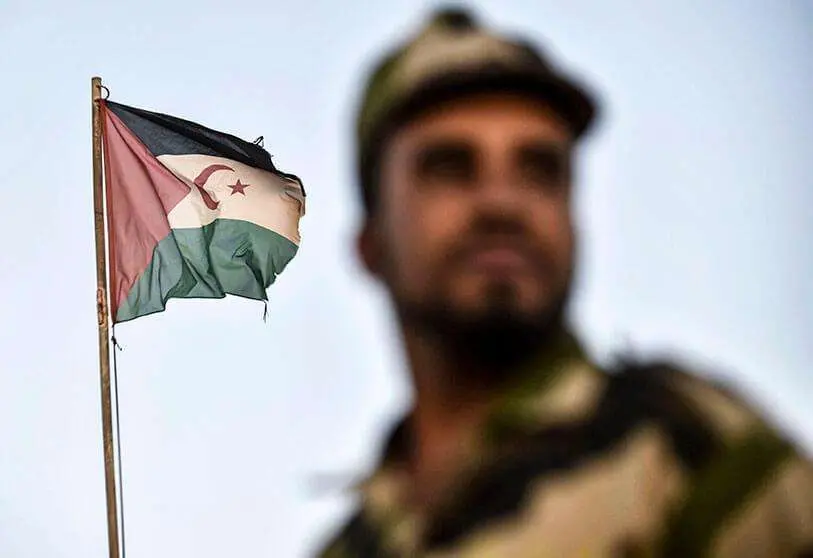Marruecos advierte sobre la influencia de Irán y Hezbolá en el Magreb a través del Polisario

Morocco's ambassador to the United Nations, Omar Hilale, has warned of the threats posed to Africa and the Maghreb by the links between Iran, Hezbollah and the Polisario Front. Responding to a question about the possible acquisition of Iranian drones by the Polisario, Hilale said at UN headquarters in New York that if these reports are confirmed, it will prove that Rabat has been right "for years" to warn that Iran and Hezbollah are infiltrating Tindouf and North Africa.
In early October, Morocco's Foreign Minister Nasser Bourita directly accused Iran of arming the Polisario Front, thus destabilising "North and West Africa". Bourita's statements came shortly after the Minister of the Interior of the proclaimed Sahrawi Arab Democratic Republic (SADR), Omar Mansour, assured that in the near future the Polisario will use drones in a new offensive against Moroccan forces.
سفير #المغرب في الأمم المتحدة :إيران زودت مقاتلي جبهة البوليساريو الانفصالية بمسيرات
— الخليل ولد اجدود khalil Jdoud (@KHjdoud) October 28, 2022
الإيرانيون و حزب الله يتوغلون في شمال إفريقيا و هذا تطور جيوسياسي خطير و يهدد الأمن القومي لدول الإقليم
هلال إيران تريد زعزعة استقرار منطقتنا بعد أن قوضت استقرار سوريا و اليمن و العراق و لبنان pic.twitter.com/CbTmoQOEwV
For the Moroccan representative to the UN, these statements are "serious". "They are destabilising our region after having done the same in Yemen, Iraq and Syria," said Hilale. The diplomat stressed that this is not only a threat to Morocco, "but to the whole area". Therefore, this situation - if true - would provoke "a game changer" and a reaction from Rabat. "They know that when Morocco decides to react, it does so in an appropriate way", Hilale stressed, according to Rue20.
The diplomat also stressed that the purchase of Iranian drones by the Polisario would reveal a "moral problem". While the separatist group boasts of having received Iranian drones, the residents of the Tindouf camps are at risk of starvation, the UN warns. Hilale explained that the cheapest model of an Iranian drone ranged from $20,000 to $22,000, which is equivalent to food rations for 300 people for a year, health care for 500 people, plus annual schooling for 120 children in Tindouf, adds the Moroccan media.

Iran, for its part, has denied sending drones to the Polisario. Shortly after Bourita's declarations, the spokesman of the Ministry of Foreign Affairs, Nasser Kanani, dismissed these accusations as "unfounded". Kanani pointed out that, instead of repeating these "unfounded accusations", Rabat should respond to "the insecurities that threaten the region due to the normalisation of its relations with Israel". Morocco, like other Arab countries such as the United Arab Emirates and Bahrain, has chosen to normalise its ties with Jerusalem by increasing bilateral cooperation in various fields.
The Iranian ministry spokesman said Morocco should strive to solve "the problems and sufferings of the oppressed Yemeni people instead of obeying Israel to impose its interests in the region". He called on Rabat to work "for the independence of the Sahrawi people in accordance with international law".

For years, Iran has provided diplomatic and military support to the Polisario, an aspect that has significantly deteriorated relations between Rabat and Tehran. Morocco decided to sever ties with Iran in 2018 after accusing it of arming, financing and training the armed group through Hezbollah. Relations between the two countries were previously suspended between 2009 and 2014. Still, Rabat continues to condemn Tehran's influence in the region, especially through the Iranian embassy in Algiers and Tunis.
The presence of Iranian drones in the Sahara would not only create controversy at the regional level, but would also provoke a reaction from the US and the EU, as has happened in the case of Ukraine, where Russian troops use Iranian-made drones. In fact, Brussels has already spoken out about this threat. European People's Party (EPP) MEP Antonio López Istúriz White recently asked the High Representative for Foreign Affairs and Security Policy, Josep Borrell, what "concrete information" the European Commission has on the Iranian drones supplied to the Polisario Front.

López Istúriz White also asked what measures the EU will take to avoid the use of these drones and prevent the escalation of conflicts in the region, as well as to prevent the infiltration of Iran into the Sahara and the Sahel.









